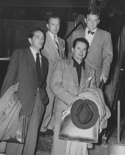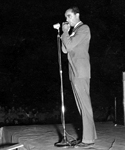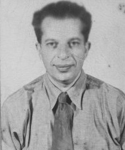Adrian and Joan Scott Papers
Adrian Scott was a screenwriter and motion picture producer. In 1947 he was called before the House Committee on Un-American Activities but refused to answer questions. Scott was jailed for one year and blacklisted as a member of the "Hollywood Ten". In 1957 Scott went to London. He returned to the U.S. in 1968. His work included the film “Mr. Lucky” (1943) and the television special "The Great Man's Whiskers" (1973), a work on Abraham Lincoln. Joan Scott was a film and television writer whose work included scripts for "Have Gun, Will Travel," "Lassie," and "SurfSide 6."
Larry Adler Papers
Adler was a self-taught harmonica player who gained worldwide recognition as the musician who brought the instrument to the ‘serious music’ stage. During World War II, he went on USO tours with the dancer Paul Draper. He performed in Germany in 1947 and 1949, in Korea in 1951, and in Israel in 1967 and 1973. In 1949 Larry Adler was blacklisted in the U.S. for having alleged procommunist leanings.
Albert Maltz Papers
Maltz was a movie screenwriter, playwright, and novelist during the twentieth century. Maltz's screenwriting career was interrupted in 1947. He was a member of the "Hollywood Ten", a group of Hollywood figures who refused to answer the questions of the House Committee on Un-American Activities concerning alleged communist influence in the movie industry. For this, he was jailed for contempt of Congress and was blacklisted by the movie industry until the mid 1960s.





